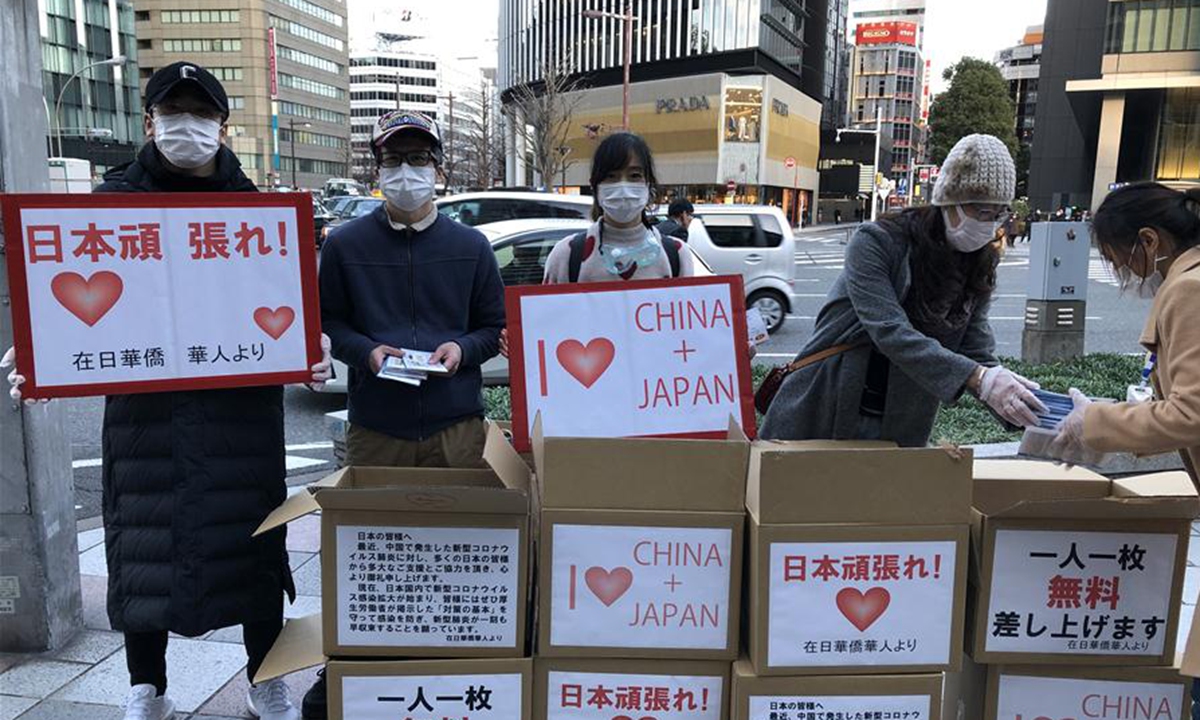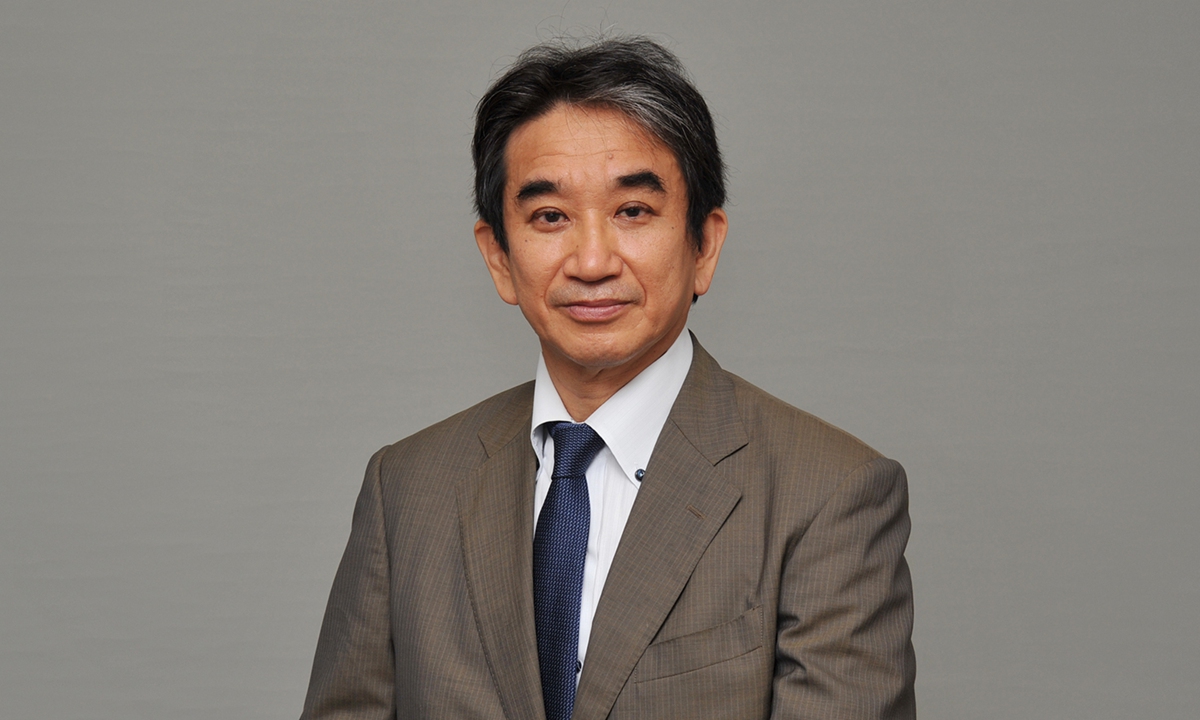Reporter's Note: Hideo Tarumi, the first incumbent Japanese ambassador to China who ‘dares’ to accept an interview with GT since 2014
By Xing Xiaojing Source: Global Times Published: 2020/12/17 22:38:58

A Chinese volunteer group distribute face masks to local people in Nagoya, Japan, February 20, 2020. /Xinhua
It is unusual that the new Japanese Ambassador to China, Hideo Tarumi, chose to accept his first interview by a Chinese media outlet, the Global Times, after he took office. Since I worked in the media industry in 2014 there have been three Japanese ambassadors to China in succession, but Tarumi is the only one willing to be interviewed by the Global Times.
When I first worked in the media industry, I often met Masato Kitera, then Japanese ambassador to China (2012-16), on various occasions. Kitera seems affable and approachable and often wore a tie with a pattern of Kumamon (famous Japanese mascot) on it.
I had a good personal relationship with Kitera, and have looked for an opportunity to interview him. I contacted the embassy about this issue, but for some reasons, it didn't work out.
Kitera told me privately that he could accept interviews, talk about travel and food, but not about politics.
Yutaka Yokoi, one of the "China School" diplomats, became Japanese ambassador to China in 2016 and delivered a speech in fluent Chinese at a press conference after he took office. At that time, there was a trend of warming relations between China and Japan, and as he was recognized as a "knowing China" ambassador, I thought he was the right person to talk about hot issues between the two countries. Unfortunately, Yokoi is conservative. When I expressed my wish for an interview many times, he always refused and made a big "cross" with both hands, leaving no room for communication.
Many people have told me that in Japanese people's impression, the Global Times is similar to the Japanese conservative media outlet Sankei Shimbun. Therefore, from the perspective of risk aversion, diplomats dare not speak out on the Global Times for fear of being criticized in their own countries.
As a reporter who mainly covers Japan, I have interviewed ambassadors from other countries, but I had never interviewed the Japanese ambassadors to China. I feel sorry for that, and I feel even sorrier that the Japanese ambassadors in China didn't dare to accept such interview for overcaution and indecisiveness.
China-Japan friendship is not difficult to talk about, even if nothing is done, the status quo seems fine. But is this a healthy relationship? Does it really make sense? For some problems, we should speak openly, even if it is noisy. At least we should keep dialogue and communication. In this process, we can get to know each other better, right?
In mid-July, it was disclosed by the Japanese media that then Japanese Minister of Foreign Affairs Tarumi was expected to be the new Japanese ambassador to China, so I began to pay close attention to his movements.
Although I had never had direct contact with him before, I heard that he has lunch and dinner with others almost every day, and eats at home only once a month. He allegedly has dinner with Chinese more than 300 times a year. These messages suggested that he should be a willing communicator.
So I decided to get an interview with Tarumi. This work started in October, since when my colleagues and I, as well as the Japanese staff, have made considerable preparations and efforts for the interview. Unexpectedly, not only did he accept the interview but he also arranged for the Global Times to be the first Chinese media outlet to interview him.

Hideo Tarumi, Japanese Ambassador to China Photo: Courtesy of Japanese Embassy in China
The reason was not clear, but in an email to the Global Times, he said, "The Global Times is an influential international media outlet in China. It is my great honor for your newspaper to ask for an interview."
The public used "unprecedented" to describe Tarumi as the Japanese Ambassador to China.
This is his fourth time to work on the Chinese mainland, and he had worked on the island of Taiwan twice and in China's Hong Kong Special Administrative Region once.
In his diplomatic career, Tarumi has never worked outside Chinese-speaking areas, which is "unprecedented" in the Japanese Ministry of Foreign Affairs.
It is customary for ambassadors of important countries first to be "trained" in countries with less important diplomatic relations, but Tarumi came to China in his first ambassadorship, which was "unprecedented."
A diplomat told the Global Times that the Japanese side believes "no one knows China better than Tarumi" and expected his arrival to help Japan find a good way to get along with China.
As the Japanese ambassador to China, his first interview by the Global Times, which is one of the most influential media outlet in China and controversial media outlet in Japan, could be regarded as the third "unprecedented."
As he is among the "China School" diplomats at Japanese Ministry of Foreign Affairs, some scholars regard him as "pro-China," which I think is a misunderstanding.
Strictly speaking, he should know and understand China well, but he always represents Japan's national interests and sticks to Japan's political views.
There are various so-called "pending cases" between China and Japan, and the possibility of friction could not be ruled out as the two countries discuss some of the issues during his time in office. As the Japanese Ambassador to China, Tarumi is willing to express himself and communicate with others, which is important and valuable to improve China-Japan relations.
Posted in: DIPLOMACY